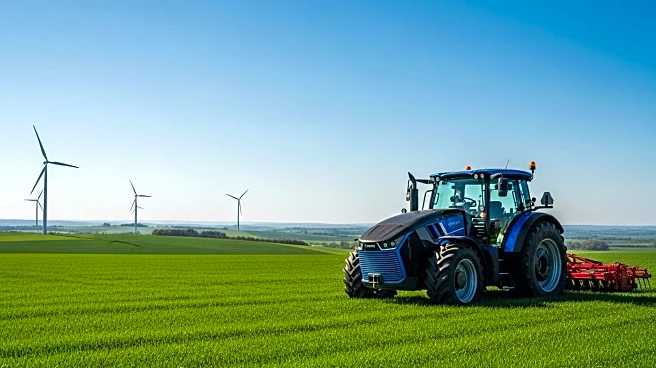What's Happening?
The global electric farm tractor market is anticipated to grow significantly, reaching USD 426.67 million by 2033, according to a report by Straits Research. This growth is driven by a compound annual growth rate (CAGR) of 10.34% from 2025 to 2033. Electric farm tractors, which are powered by electric motors rather than traditional internal combustion engines, offer several advantages including lower fuel costs, reduced carbon emissions, and improved energy efficiency. These tractors are becoming increasingly popular among farmers worldwide due to their reliability, cost-effectiveness, and environmental benefits. The market expansion is further supported by advancements in battery technology and electric drivetrains, as well as government initiatives promoting eco-friendly farming technologies.
Why It's Important?
The shift towards electric farm tractors is significant for the agricultural industry as it aligns with global efforts to reduce carbon emissions and promote sustainable farming practices. The adoption of electric tractors can lead to substantial cost savings for farmers, particularly in terms of fuel and maintenance expenses. Additionally, government-backed programs and subsidies are encouraging farmers to invest in electric-powered machinery, which could accelerate the transition to more sustainable agricultural practices. This trend is expected to benefit small and medium-scale farmers, enhancing their productivity and reducing their environmental footprint.
What's Next?
The electric farm tractor market faces challenges such as the limited availability of charging infrastructure and the prevalence of conventional tractors in rural areas. However, the growing adoption of precision farming presents new opportunities for market expansion. Precision agriculture, which optimizes resources like water and fertilizers, can benefit from the energy-efficient operations enabled by electric tractors. As demand for sustainable agricultural solutions increases, the market is likely to see further growth, particularly in regions like Asia-Pacific and North America where government support and mechanization rates are high.
Beyond the Headlines
The transition to electric farm tractors could have long-term implications for the agricultural sector, including shifts in equipment rental services and the development of new business models centered around sustainable farming. As the market evolves, there may be increased focus on integrating electric tractors with smart farming technologies to enhance efficiency and productivity. This could lead to broader changes in agricultural practices and contribute to global efforts to combat climate change.









